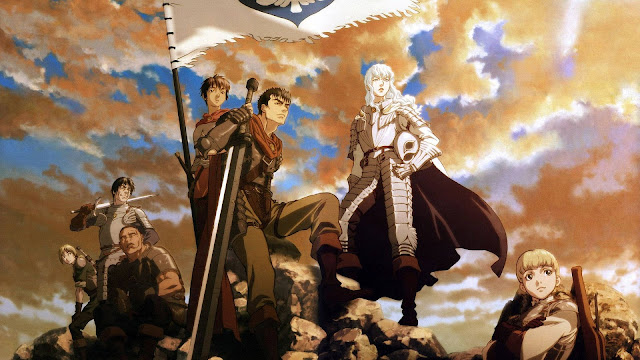THE LESSON I LEARNED FROM GAME OF THRONES AND BERSERK
- Obtener enlace
- X
- Correo electrónico
- Otras aplicaciones
WARNING: SPOILERS
Game of Thrones left a lasting impression on me. I still remember back in the summer of 2011, on the brink of finishing college, when amidst beers at a bar in Pamplona, my friends skeptically discussed the scene in which King Robert Baratheon visits Winterfell on the first Samsung Galaxy S. They had already tackled the hefty tomes of George R. R. Martin's A Song of Ice and Fire series, and the announcement of the series months earlier had raised expectations. It wasn't until two years later that I decided to start watching the show, devouring the three seasons already aired. The impact was so profound that, upon finishing the third season, I couldn't bear to wait another year for the fourth, so I scoured the libraries of my city to reserve the book that followed the season I had just watched. While I already associated the characters with the actors, many others appeared, and the details of each, the descriptions of the places, actions, and environments were such that I formed a very particular idea of each of them. Then came the slight disappointment after continuing to watch the saga. If you can read a novel on which a movie or series is based, do it, because you'll enjoy it three times as much.
What captivated me the most about the series is a subliminal message that I personally extract. As its name suggests, the Game of Thrones is a constant struggle for power in order to govern and control others, the closest thing to being God that can be experienced in this life. The pride of the most powerful houses or families is the main spark to achieve it, although it is true that if anyone had even the slightest chance, they would try it. Betrayals and bloodshed abound to achieve it or to be part of that "wheel" that is often described to rise above all, which is the backbone of the series and partly reminiscent of the current world. That feeling of power over others is granted by the addiction to controlling others, and needless to say, each of us can experience it as dominators or submissive in a thousand aspects of life. Our roles at work are an example of this, but also in family, circle of friends, business, etc., where often our own pride, ego, controls us. It comes in handy in small doses to avoid being dominated and to maintain boundaries, so its total absence is an absolute advantage for those thirsty for power. Both in Game of Thrones and in life itself, all of this happens, and we must not forget the masses, those fearful sheep that run in a flock when a wolf appears, and that huddle around a king shepherd and his protective dog. Well, you know, that in the name of the good of the flock, we submit to the rulers and their laws so that they protect us from the evils of the world. Other times the excuse is sacred books and the shepherds disguise themselves as messengers of a true god. Fear, fear is the key.
Game of Thrones pushes this to the limit, in a European medieval setting that sometimes falls short of the reality of previous centuries. Needless to say what they would not do if those kings of the world could access modern weapons. Only knowledge and love are what can make us overcome that filter in the future.
But all this, which we could summarize as the evolution of a highly hierarchical simian society that seeks the power and control of others, and to whom it is left, will do so, takes a backseat in the face of the imminence of death. The series, like reality itself, traps you in plots and conspiracies to dominate others in the name of different faiths, families, or constructs as abstract as The North, and literally their lives are at stake. Meanwhile, on the other side of The Wall, the so-called White Walkers gradually approach, sowing death to every living being regardless of anything previous except that they can breathe. An army of the dead that does not distinguish between kings and vassals, and that as they fall they swell that army of undead with the same purpose of making night and death eternal. Only a handful of books warn of their arrival and the importance of keeping them out of the wall and the living. Fewer are the people who also warn and if they do it is because they have seen them with their own eyes. For the rest, they are just stories. I don't know about you, but for me it is impossible not to think that the army of the dead is the filter of our extinction. Something bigger than us and that is alien to our thirst for power and quarrels is approaching to sweep us off the map. Climate change? Nuclear war? Superbacteria? A new unstoppable virus? The ticking of a supervolcano waiting to erupt? Meteorite? The White Walkers sum all that up, and every step they take towards the wall that protects us is less time we have left. Only the terrifying display of one of those undead in the capital of the kingdom convinced politicians for a truce, to join forces, and to defeat them, reminding us of our fragility and our unity in the face of a common threat.
A series that reminds me a lot of this sinister pattern is the anime Berserk. The entire plot of the anime is pure struggle and battle between kings in the same medieval setting. It captivates you from the first chapter, and although sparingly, they mention that there are elements of another evil world that lurks in the world of men. It is not until the end of the series that this mystical world opens up through pacts that go unnoticed in the main plot, and sweeps the living. Those survivors are marked to fight against the demonic forces in the stories that followed the anime. Death is the great equalizer, reminding us of our own mortality and the ephemeral nature of our earthly concerns. Ultimately, our time in this world should be used to appreciate and marvel at our existence, and to love and understand others, rather than being mere pawns in the power game of others.
- Obtener enlace
- X
- Correo electrónico
- Otras aplicaciones






Comentarios
Publicar un comentario